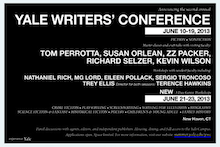The essay begins like this:
“Dear Mr. Algren,” a young woman writes from Wheaton (Ill.) College, ‘I am a freshman and am standing on the threshold of a literary career. What is my next move?'”
“Your next move, honey,” I had to caution her, “is to take two careful steps backward, turn and run like hell. That isn’t a threshold. It’s a precipice.”
The girl appears to feel that she is about to be welcomed through the gates of that enchanted land named “The Smiling Side of American Life” by William Dean Howells; later to be packaged by Richard Nixon as “Our Free Civilization”; then telecast as Marlboro Country.
A smiling image yet sustained, in air-conditioned stillnesses, when summer is the season. Then Creative Writers’ Workshops, poetry seminars and Festivals of the Arts will materialize midst campus greenery. The Failure of Hemingway The Failure of Faulkner The Failure of Whitman The Failure of Melville The Failure of Crane The Failure of Twain The Failure of London and The Failure of Wolfe will be revealed by one-book novelists embittered by the failure of David Susskind to invite them to a party where they might have met George Plimpton or even Allen Funt. Just anybody.
Perpetual panelists will clobber perpetually rejected novelists with symbolisms concealed in the work of other perpetual panelists. Manuscripts will be returned bearing the instruction: Insert more symbols. This can happen anywhere but chances are better in Vermont.
With the Vermont reference, Algren was pointing to the Bread Loaf Writers Conference at Middlebury College, where he taught one season — or rather didn’t, as the complaint about him went — so he knew firsthand whereof he spoke. Bread Loaf still exists . . . plus ça change . . . and so does the Iowa Writing Workshop, a two-year residency program at the University of Iowa. Algren briefly taught there, too, during the Vietnam War. The same complaint trailed him in Iowa: the man refused to take the job seriously and, with a few exceptions, the students as well. Which is what the complaint was really about. Any doubt of that is cleared up here:
“Good writing thrives like corn in Iowa City,” Miss Wheaton, still perplexed reads in the N.Y. Times, “where 125 of the nation’s most promising writing students just signed up for another semester of agony and ecstasy at what is generally considered the best author’s course in the United States — the Iowa University Writing Workshop.”
A six-month deferment from the armed services or the chance to have a steady boyfriend free from parental supervision provides the ecstasy; the agony belongs to the parents footing the bills. For what is offered at Iowa is cover, concealment and sanctuary. Their parents’ whole purpose having been to protect their young, out of their playpens and into their teens, from winds of economic weather, the kids who come to the Iowa Workshop have never even been rained on, poor things. Their strongest passion is watching Batman and their greatest hope that they will never get wet.
The Famous Writers School, where it happens Algren didn’t set foot– either because he was too disreputable to be asked or his expertise wasn’t needed — takes plenty of flak even so.
“Are you one of the quiet ones who should be a writer?” The Famous Writers School asks the same question that the founder of the Iowa Workshop — himself a “Famous Writer” — is asking: “If you are reserved in a crowd you may be bottling up a talent that could change your life. If you’ve been keeping quiet about your talent, here’s a wonderful chance to do something about it. The first step is to mail the coupon below for the free Writing Aptitude Test.”
The second step is to unbottle your money and send us some.
He also picks on the prestigious Stanford Creative Writing Program at Stanford University, which reflected its founder Wallace Stegner’s “confidence in campus sanctuaries,” inspiring no confidence in Algren at all.
Prof. Stegner is laboring under the illusion, common to academics, that knowledge of the best that has been thought and said has a compassionating impact upon the human spirit: a premise of American criticism since the days of the Transcendalists; who came up with their best ideas under a campus moon.
That a dedication to the printed word may conceal an indifference toward cruelty; and that understanding of justice and human dignity becomes enfeebled in proportion to one’s sophistication should be obvious by now. Unless we’ve forgotten that it was scholars well-disciplined in Shakespeare, Hegel, Goethe, Freud, Marx, Dante and Darwin, who yet devised the cultural programs at Auschwitz.
Yes, Algren was painting with a broad brush. But that doesn’t make what he was saying any less true. By the time he gets done with Jacques Barzun, S.I. Hayakawa, Norman Podhoretz and — how dare he? — God Himself, all in the same essay, you’ll be laughing out loud and wishing never to read a writer with a thinner brush.
Nelson, you were so much fun.





